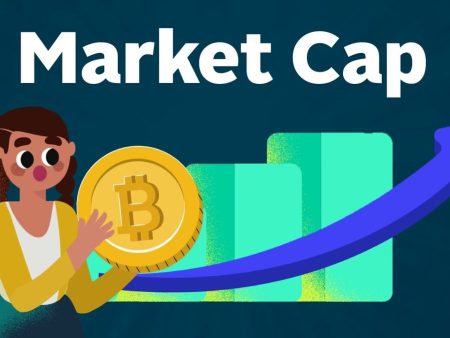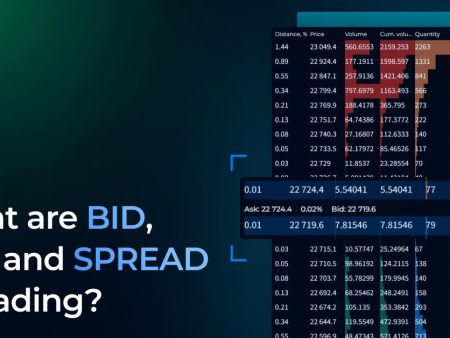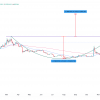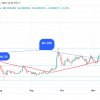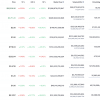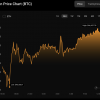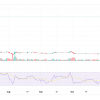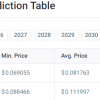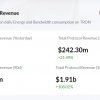
Table of Contents
Trading Dictionary
Learn all of the most important blockchain and cryptocurrency terms and jargon here.
Alpha Coefficient
| Parameter | Definition |
|---|---|
| Alpha Coefficient | A crucial parameter for assessing the effectiveness of capital management considering risk. It accurately estimates the average income generated by an investment portfolio, indicating how much it outperforms the market. In the crypto world, Bitcoin (BTC) serves as the benchmark. If an altcoin grows 10% in a year while BTC grows 8%, your alpha is 2%. |
Altcoin
| Term | Definition |
|---|---|
| Altcoin | Any cryptocurrency created after Bitcoin. This term blends “alternative” and “Bitcoin.” Most modern cryptocurrencies fall under the category of altcoins. |
Arbitration
| Term | Definition |
|---|---|
| Arbitration | A trading method based on executing opposing transactions with similar assets when a financial difference arises in their value. It involves buying a cheaper asset and reselling it at a higher price. However, this isn’t traditional speculation; it typically requires two similar assets or exchanges. One offers a lower price, while the other offers a higher price. The goal is to profit from the price convergence. |
Beta Coefficient
| Parameter | Definition |
|---|---|
| Beta Coefficient | An indicator for assessing market risk associated with a security or portfolio. It helps in selecting securities that won’t weaken a portfolio. Beta measures the asset’s or portfolio’s dependence on overall market dynamics as indicated by a broad market index like S&P 500 or Nasdaq. |
Blockchain
| Term | Definition |
|---|---|
| Blockchain | A database constructed with specific rules – a continuous chain of blocks containing transaction information by system participants. Each block records a set of transactions, much like beads on a necklace. The blockchain is indestructible and enhances the efficiency of financial transactions and information exchange across individuals, corporations, and the public sector. |
Bond
| Term | Definition |
|---|---|
| Bond | An issued debt security, entitling the holder to receive its value in money or equivalent property from the issuer within a specified period. Bonds are issued by companies or governments to raise funds, providing periodic payments and potential profit through price difference. |
Bitcoin Dominance
| Term | Definition |
|---|---|
| Bitcoin Dominance | A synthetic indicator calculated as the percentage ratio of Bitcoin’s market capitalization to the total capitalizations of other cryptocurrencies. |
Broker
| Term | Definition |
|---|---|
| Broker | An intermediary in stock or crypto markets, licensed to conduct securities transactions on behalf of investors. Only accredited market participants can place orders on the exchange; individuals cannot. |
Candlestick Chart
| Term | Definition |
|---|---|
| Candlestick Chart | A chart displaying OHLC (Open-High-Low-Close) prices, representing opening and closing prices and the highest and lowest prices during a trading session. |
Cluster Bar
| Term | Definition |
|---|---|
| Cluster Bar | A vertical accumulation of clusters. A single bar typically contains several clusters, providing detailed volume information for each price level. It’s essentially a candlestick X-ray, offering objective information without guesswork. |
Cluster Chart
| Term | Definition |
|---|---|
| Cluster Chart | A chart type underlying cluster analysis, showing the trading volume at different prices and times. It consists of rectangles (clusters) with embedded information about traded volume, buy-to-sell ratios, and more. |
Conspiracy Theory
| Term | Definition |
|---|---|
| Conspiracy Theory | A market trend where participants believe in unproven coincidences and accidents. |
Convergence
| Term | Definition |
|---|---|
| Convergence | The process of alignment, compromise, and convergence, opposite to divergence, in various natural sciences and humanities. |
Counterparty
| Term | Definition |
|---|---|
| Counterparty | A party involved in a transaction. It can be a buyer to a seller or vice versa, including traders, brokers, and market makers. |
Covariance
| Term | Definition |
|---|---|
| Covariance | A measure of how two random variables change relative to each other, often used in finance to describe the return on different investments over time. |
Cumulative Delta
| Term | Definition |
|---|---|
| Cumulative Delta | Represents the cumulative delta over a specified time, visually displayed as a histogram. Delta is the difference between market orders executed at the ASK and BID prices, revealing market sentiment. |
Deflation
| Term | Definition |
|---|---|
| Deflation | A decrease in the general price level of goods and services, opposite to inflation, leading to an increase in purchasing power. |
Depth Density (DD)
| Term | Definition |
|---|---|
| Depth Density (DD) | Aggregated stock market data that filters out algorithmic trading noise and includes information on static limits in the stock. It allows scaling for better data analysis. |
Devaluation
| Term | Definition |
|---|---|
| Devaluation | A decrease in the exchange rate of a national currency against hard currencies, often used by central banks as a tool to manage the national currency’s value. |
Divergence
| Term | Definition |
|---|---|
| Divergence | A term used in economics to describe increasing differences between national economic models, structures, and mechanisms. |
Diversification
| Term | Definition |
|---|---|
| Diversification | The practice of creating an investment portfolio with unrelated financial instruments to reduce risk and systematize income. |
Exchange
| Term | Definition |
|---|---|
| Exchange | A platform where buyers and sellers conduct transactions for various assets, including money, commodities, securities, and derivatives. |
Forward
| Term | Definition |
|---|---|
| Forward | An agreement where one party agrees to transfer an underlying asset to another party at a specified time or perform a related monetary obligation. |
Futures
| Term | Definition |
|---|---|
| Futures | Derivative financial instruments for buying and selling underlying assets like commodities, securities, etc., with prices fixed at the time of the transaction. |
Gap
| Term | Definition |
|---|---|
| Gap | A significant difference between the closing and opening prices of consecutive trading periods, often caused by non-trading hours. |
GitHub
| Term | Definition |
|---|---|
| GitHub | The largest web service for hosting IT projects and collaborative development, based on the Git version control system. |
ICO – Initial Coin Offering
| Term | Definition |
|---|---|
| ICO – Initial Coin Offering | A fundraising method where new cryptocurrency units are sold to investors through one-time or accelerated generation. |
IEO – Initial Exchange Offering
| Term | Definition |
|---|---|
| IEO – Initial Exchange Offering | A variant of ICO supervised by an exchange, involving the listing of tokens on a trading platform to attract additional investments. |
Imbalance
| Term | Definition |
|---|---|
| Imbalance | A market state where either supply or demand significantly prevails. |
Inflation
| Term | Definition |
|---|---|
| Inflation | A long-term increase in the general price level of goods and services, reducing the purchasing power of money. |
Limit Order
| Term | Definition |
|---|---|
| Limit Order | An order to buy or sell at a specified price, with execution not guaranteed. |
Liquidity
| Term | Definition |
|---|---|
| Liquidity | The property of assets to be quickly sold at a price close to the market price, ranging from highly liquid to illiquid. |
Market Capitalization
| Term | Definition |
|---|---|
| Market Capitalization | The value of an asset calculated as the current market price multiplied by the issued volume. |
Market Maker
| Term | Definition |
|---|---|
| Market Maker | A provider of liquidity in markets, often automated by algorithms, ensuring continuous trading. |
Market Order
| Term | Definition |
|---|---|
| Market Order | An immediate purchase or sale order of a financial instrument at the best current market price. |
Money Issue
| Term | Definition |
|---|---|
| Money Issue | The process of issuing money into circulation, increasing the money supply. |
Offshore
| Term | Definition |
|---|---|
| Offshore | A country or territory offering special conditions for foreign companies to conduct business, often associated with low taxes, simple reporting rules, and anonymity for business owners. |
Option
| Term | Definition |
|---|---|
| Option | A contract giving the buyer the right (but not obligation) to buy or sell an asset at a predetermined price within a specified period. |
Order Book
| Term | Definition |
|---|---|
| Order Book | A list of buy and sell orders for securities, contracts, and other assets, typically presented in a table format. |
Pairs Tree
| Term | Definition |
|---|---|
| Pairs Tree | A trader’s tool displaying a list of trading pairs for analysis, consolidating asset information from various exchanges. |
Price Action
| Term | Definition |
|---|---|
| Price Action | A branch of technical analysis that assesses price behavior without using indicators, relying solely on candlestick charts. |
Price Step
| Term | Definition |
|---|---|
| Price Step | A setting affecting data download speed, changing the cluster’s size in height based on the asset’s volatility. |
Pump & Dump
| Term | Definition |
|---|---|
| Pump & Dump | A rapid market price increase followed by a sharp decline, often orchestrated for profit. |
Quotation
| Term | Definition |
|---|---|
| Quotation | The announced price at which a seller or buyer is willing to trade an asset, often associated with fast-changing prices in exchange markets. |
Risk Management
| Term | Definition |
|---|---|
| Risk Management | The process of making and executing decisions to reduce the likelihood of adverse outcomes and minimize potential project losses. |
Risk/Reward
| Term | Definition |
|---|---|
| Risk/Reward | An indicator that estimates potential profit relative to possible loss in a trade, calculated based on the stop order. |
Spoofing
| Term | Definition |
|---|---|
| Spoofing | A deceptive trading strategy where a trader creates false impressions in the market by placing and canceling orders to manipulate prices. |
Spread
| Term | Definition |
|---|---|
| Spread | The difference between the best bid (Ask) and ask (Bid) prices for an asset, with tighter spreads indicating greater liquidity. |
Stablecoin
| Term | Definition |
|---|---|
| Stablecoin | Cryptocurrencies designed to maintain price stability, often pegged to fiat currencies or commodities. |
Stock
| Term | Definition |
|---|---|
| Stock | A type of security representing ownership in a company, entitling the holder to dividends, voting rights, and a share of assets in case of liquidation. |
Stop Loss
| Term | Definition |
|---|---|
| Stop Loss | An exchange order placed by a trader to limit potential losses when the price reaches a predetermined level. |
Take Profit
| Term | Definition |
|---|---|
| Take Profit | An exchange order placed by a trader to lock in profits at a specified level. |
Technical Analysis
| Term | Definition |
|---|---|
| Technical Analysis | A set of mathematical and statistical tools used to predict price changes based on past price patterns. |
Ticker
| Term | Definition |
|---|---|
| Ticker | A short name or identifier for quoted instruments in an exchange’s information system, used to avoid constant repetition of full security names. |
Time & Sales
| Term | Definition |
|---|---|
| Time & Sales | Detailed transaction information showing volume, price, time, and initiating order direction, providing insight into market activity. |
Timeframe
| Term | Definition |
|---|---|
| Timeframe | A market abstraction representing the interval used to convert asset quotes into chart elements, allowing traders to visualize price changes over that interval. |
Token
| Term | Definition |
|---|---|
| Token | A unit of record in a blockchain, not considered a currency, often representing ownership or utility within a project. |
Tokenomics
| Term | Definition |
|---|---|
| Tokenomics | An economic model for cryptocurrencies (tokens) that considers the interests of all participants, including investors, users, founders, and developers. |
Trading Pair
| Term | Definition |
|---|---|
| Trading Pair | The ratio of prices between two assets in a pair, where the first asset is the base asset, and the second is the quote currency. |
Trend
| Term | Definition |
|---|---|
| Trend | The fundamental tendency for something to change, often described mathematically, such as in price movements in financial markets. |
Volatility
| Term | Definition |
|---|---|
| Volatility | A financial indicator reflecting the magnitude of price changes in an asset or commodity over a short period, with greater volatility indicating higher risk and potential for profit |

